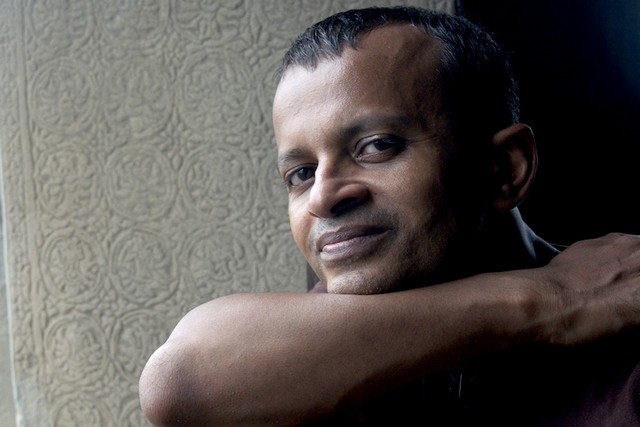It’s a wonderful moment in a novel packed with memorable scenes. Romola, widowed and abstaining from meat and fish in keeping with her Hindu custom, has swapped India for suburban Californian life with her son’s family. She is restless and stifled. “I am going to McDonald’s,” she finally says, exasperated, to an empty house. “And no one can stop me.”
The book’s Bengali author, Sandip Roy, says: “You know, something like that happened to me.”
It’s not a surprise – Don’t Let Him Know is a fascinatingly authentic look at two generations of an Indian family living in Kolkata and America.
“I was living in San Francisco and my parents had come over to see me,” Roy says. “I was trying to impress them by taking them to a Korean restaurant one night, a Japanese restaurant the next, a Thai place the day after that. And in the end my mother pulled me aside – very sheepishly – and said: ‘Can’t we just go to McDonald’s?’. It hadn’t got to India at that point and it genuinely completed the trip for her.”
There are, of course, plenty of celebrated novels that chronicle the trials, tribulations and contradictions of the Indian immigrant experience. Roy might not be breaking fresh ground with his debut novel – but the way he tells his story does feel new.
Right at the start, a secret is laid bare: Romola’s son Amit finds a letter in an old address book, which suggests to him that she’d been in love with another man when she went to America with her new husband. In fact, the secret is far more delicate than that, but Roy carefully, quietly, allows it to percolate through the decades.
“There is the potential for a big showdown with Romola’s husband, Avinash, something that would have fulfilled my Bollywood soap-opera fantasies,” says Roy. “But that’s not the culture I grew up in. That’s not what life is like. Most people, I think, try to find some sort of peace in their family relationships, despite their flaws.
“So Romola fashions a life back in India, which, despite her husband hiding something devastating from her, she doesn’t want to shatter. Avinash is a decent man and basically a good father. Amit is supposedly the perfect son but is compromised. To me, that’s more realistic than a love story with explosive happiness. That only happens in the movies.”
Which is not to say that Romola is a victim – she’s a brilliantly vibrant and assertive character who probably has more adventures than the rest of her family put together. And the way in which her escapades, in India and America, are told is interesting, too: the chapters in Don’t Let Him Know are self-contained, non-linear vignettes that gradually build up a picture of the family over the decades. For some, the lack of a real narrative arc might be frustrating but actually, it’s balanced by drawing a broad tableau of convincing characters.
“It’s not an immigration novel because that doesn’t necessarily define their lives,” says Roy. “What I really wanted to show is that the characters are all trying to fit in, in worlds where they’re not entirely comfortable, whether that’s because of immigration, sexuality, traditional demands, the perceived ‘role’ of women, and so on.
“I know this from going to America as an adult and then, 20 years later, coming back to India. You make the best home you can in the place that you are. That doesn’t necessarily mean you’ll be outstandingly happy, because there will always be prickly edges when you are somewhere different. But you can create a place of contentment, at least.”
And, interestingly, despite globalisation, despite the fact that there are now 300 McDonald’s in India, Roy thinks that America, for the Indian immigrant, still has that potential to stir up all kinds of issues of identity.
“It’s funny, I’ve just written a piece on Bobby Jindal, the governor of Louisiana,” says Roy, who is a senior editor at Firstpost.com and blogs for The Huffington Post. “He gave a speech where he basically said he was American, not Indian-American – and yes, he was born in Baton Rouge. But the speech implied that ‘the hyphen’ is suspect, like a dual loyalty. It’s interesting that a successful politician like him, who wants to run for president, does, in my view, feel being labelled Indian-American is somehow a burden.
“So, for me, there’s always that bristling sense of push and pull when Indian people go to America.”


